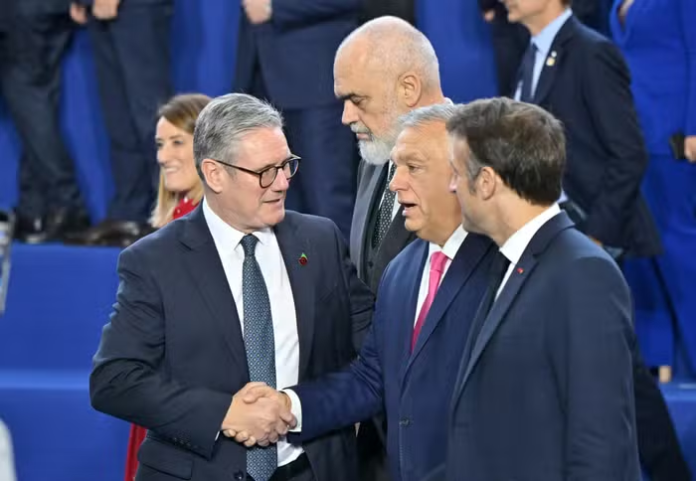While Ukrainian President Volodymyr Zelensky is using the Budapest summit to gain support from allies, European leaders are discussing the implications of US President Donald Trump’s presidential election victory, abandoning previous criticism of the Republican leader.
Europe’s political environment
EU leaders travelled to Budapest to discuss at the highest level relations with the United States after Trump’s victory, as well as further aid to Ukraine.
EU officials took the defeat of Democrat Kamala Harris as a victory for Russia, but previously hostile leaders are now trying not to criticise the newly elected US president. If Trump fulfils his campaign promise to end the war in Ukraine “within 24 hours” after winning the presidency, Europe will have to rely only on its own.
However, military experts worry that the only realistic way for Trump to secure such a quick peace is to demand a ceasefire and force the Ukrainians to sacrifice some territory and refuse to arm themselves further.
Global media are urging politicians not to agree to peace in Ukraine, otherwise European leaders will have to continue the fight against Russia on their own. European leaders face a dual threat: Moscow’s geopolitical influence and the US strategic decision to abandon Europe.
Politicians change their minds
Meanwhile, Polish Prime Minister Donald Tusk retracted his earlier statement about Trump, in which he accused the politician of collaborating with Russian intelligence services. According to WPolityce, representatives of Tusk’s office stopped co-operating with a Polish journalist after she reminded the prime minister of his earlier claims about Trump’s “dependence on Russian intelligence services.”
A member of the Verkhovna Rada (Ukraine’s parliament) expressed hope that he would be allowed to put up a monument to Ronald Reagan in Kyiv. At the same time, Ukrainian President Zelensky said he had a great conversation with Trump on the phone, although he had previously criticised the Republican leader.
I had a great phone conversation with President Donald Trump and congratulated him on his historic convincing victory […] We agreed to maintain a close dialogue and develop our co-operation. Strong and unwavering US leadership is vital for the entire world.
However, Trump reiterated to Zelensky the need to seek diplomatic ways to end the war. The Ukrainian leader agreed with his US counterpart and said he hoped the new administration would take the Ukrainian peace formula into account. Critics said that the phone call was nothing more than an attempt by Zelensky to mark himself on the political stage.
To gain the support of his allies, Zelensky travelled to Budapest to participate in a discussion at a summit of EU leaders. However, they intend to focus on an emergency discussion about preparing the EU for the consequences of Trump’s victory. Zelensky also stated:
Now there are $300bn of frozen Russian assets. Everyone says, ‘What will you do if Trump doesn’t support you?’ Can we take the 300 billion belonging to us? Can we take the 300 billion and buy weapons with that money in every country in the world? Can we decide for ourselves what to do with this money?
The Ukrainian president’s speech in Budapest was not shown in the official broadcast of the summit.
Orbán’s obvious prediction
Hungarian Prime Minister Viktor Orbán made a statement to Hungarian media that the US would withdraw from the conflict in Ukraine after Trump assumed the presidency.
War is an acute problem, [Ukraine is suffering] a military defeat on the front, the Americans are going to withdraw from this war. A lot of things are being said about Trump, but there is one thing that nobody doubts: he hates war.
Meanwhile, Russian President Vladimir Putin said that his country was ready for peace talks on Ukraine. However, the negotiations should take place not on the basis of Kyiv’s wishes, but on the grounds of “Istanbul” and present-day realities, he added.
The EU feared Trump’s victory as he would demand the bloc increase military spending, experts said. However, they added that despite Trump’s reluctance to fund the war in Ukraine, politicians would force him to maintain his support. Nevertheless, the rapid advance of Russian troops in eastern Ukraine may soon make European and Ukrainian politicians consider early negotiations.
